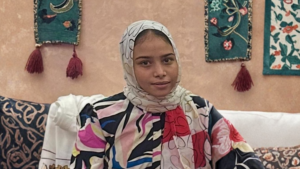A video of Egyptian blogger Hadir Abdel Razek being assaulted by her ex-husband went viral this week. The footage, captured from a hidden camera inside her home, shows him attacking her while she tries to protect herself. The public’s reaction has been louder than ever, but for all the wrong reasons.
While some expressed outrage, far too many used the incident to mock Hadir. They questioned her lifestyle, speculated about her morality, and justified the violence because they did not approve of how she lived.
This is not just a case of domestic violence. It is a case of how society continues to punish women who do not fit into its narrow definition of what a victim should look like.
Both Hadir and Her Ex Were Arrested, and She Went Live as Police Tried to Enter Her Apartment
Shortly after the video spread, both Hadir and her ex-husband were arrested. While the charges against him relate to the documented assault, Hadir is also being investigated—reportedly for filming the incident without consent and other allegations surrounding her online content.
During the arrest, Hadir went live on social media. In the video, she can be seen panicked and pleading for help. She refused to open the door to the police, calling out for emergency services and trying to contact her father. Her voice shook as she asked for protection and begged for someone to intervene. But no help came.
She was eventually detained.
What was clear from the livestream was this: Hadir was terrified, isolated, and reaching out to the only platform where she still had a voice. And even then, that voice was ignored.
The Assault Happened. So Why Are We Talking About Her Camera?
After the video went public, Hadir’s ex-husband’s lawyer confirmed the assault happened. Instead of focusing on the violence, he claimed the issue was that Hadir secretly filmed him. He also accused her of drug use.
It is shocking that the narrative immediately shifted from the abuse itself to whether or not Hadir had the right to document it. Even if she did film him without consent, that does not make her the criminal. Recording someone who has been repeatedly abusive is a survival tactic, not a crime.
Society needs to stop using women’s actions as distractions from the abuse they endure. The law must protect women’s safety first, not their abuser’s privacy.
This Is Bigger Than Hadir. This Is About the Women No One Defends
If Hadir were more “respectable” in the eyes of the public, the reaction would have been very different. The only reason many people feel comfortable ridiculing her is because they already judged her lifestyle.
But here is the uncomfortable truth. Many women who are publicly sexualized or working in controversial industries are not there by choice. Many are trafficked, coerced, or manipulated into that world. Hadir’s case should not just open the conversation about domestic violence, it should raise serious questions about sex trafficking in Egypt and the Middle East.
There is no public language, no policy focus, and no protective infrastructure for women who are in the digital space but are also being exploited. And when these women speak up or try to escape, society either silences them or criminalizes them.
Stop Asking If She Deserved It, Start Asking Who Profits from Keeping Her There
If Hadir was being trafficked, coerced, or financially controlled, then what she is going through is much more than a toxic relationship. It is systematic abuse. But instead of looking deeper, people are more concerned with blaming her for the image she presents online.
This is not just about Hadir.
It is about every woman whose safety and agency are taken from her, then used against her as evidence that she cannot be trusted.
Egypt needs to start asking real questions.
Who owns the platforms that profit off women like Hadir?
Who helps build their image and then disappears when things go wrong?
Who benefits when the only acceptable female victims are the silent, obedient ones?
You Can Disagree with Her Lifestyle and Still Know She Deserves Protection
You do not have to follow Hadir, admire her, or even respect her. You do not need to agree with the choices she has made or the way she presents herself. But if you find yourself feeling neutral or entertained by her abuse, something is broken.
Being a woman who is trafficked, exploited, or simply living in a way that society disapproves of does not make her less human. It does not strip her of the right to be safe in her own home.
We Need New Language for the Women We Refuse to See
This is not just a moment to discuss domestic violence. This is a moment to ask why our system has no space for the women who are trafficked digitally, emotionally, and financially. Women who are discarded the second they are no longer profitable or entertaining. Women who are punished for trying to survive.
Until we build that space, we are not protecting women. We are just protecting the image of the women we think are worth saving.
If you or someone you know is facing abuse or exploitation, seek support. And if you’re not sure whether someone is in control of their own life, ask why that matters more than the violence done to them.





